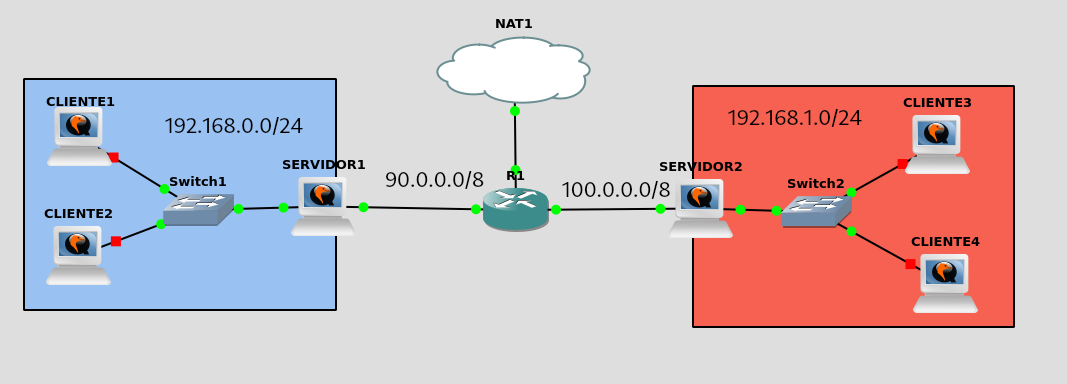Comparative between OpenVPN and Wireguard

The goal of this post is to compare the different VPNs software most used by seeing which is faster, for which we will support in speed test using iperf3.
[NOTE] The comparative part of the posts in this section in which we mount each type of VPN.
Speed without VPN
I’m gonna start by comparing the speeds of these 2 systems, using iperf3. For this I have removed the cisco router as I had it configured with FastEthernet interfaces and changed it to a Linux router with GigabitEthernet interfaces.
I’m going to launch an iperf3 using public addresses so that the traffic does not use any VPN:
javiercruces@servidor2:~$ iperf3 -c 90.0.0.2 -i 1 -t 30
Connecting to host 90.0.0.2, port 5201
[ 5] local 100.0.0.2 port 32858 connected to 90.0.0.2 port 5201
[ ID] Interval Transfer Bitrate Retr Cwnd
[ 5] 0.00-1.00 sec 110 MBytes 919 Mbits/sec 897 188 KBytes
[ 5] 1.00-2.00 sec 102 MBytes 859 Mbits/sec 712 120 KBytes
[ 5] 2.00-3.00 sec 111 MBytes 931 Mbits/sec 735 83.4 KBytes
[ 5] 3.00-4.00 sec 112 MBytes 944 Mbits/sec 600 173 KBytes
[ 5] 4.00-5.00 sec 109 MBytes 913 Mbits/sec 1018 126 KBytes
[ 5] 5.00-6.00 sec 115 MBytes 961 Mbits/sec 889 113 KBytes
[ 5] 6.00-7.00 sec 113 MBytes 947 Mbits/sec 549 90.5 KBytes
[ 5] 7.00-8.00 sec 116 MBytes 976 Mbits/sec 964 198 KBytes
[ 5] 8.00-9.00 sec 114 MBytes 956 Mbits/sec 591 76.4 KBytes
[ 5] 9.00-10.00 sec 108 MBytes 908 Mbits/sec 736 120 KBytes
[ 5] 10.00-11.00 sec 105 MBytes 881 Mbits/sec 689 126 KBytes
[ 5] 11.00-12.00 sec 106 MBytes 893 Mbits/sec 745 124 KBytes
[ 5] 12.00-13.00 sec 118 MBytes 990 Mbits/sec 847 93.3 KBytes
[ 5] 13.00-14.00 sec 122 MBytes 1.03 Gbits/sec 899 94.7 KBytes
[ 5] 14.00-15.00 sec 125 MBytes 1.05 Gbits/sec 1014 73.5 KBytes
[ 5] 15.00-16.00 sec 125 MBytes 1.05 Gbits/sec 973 113 KBytes
[ 5] 16.00-17.00 sec 109 MBytes 915 Mbits/sec 934 86.3 KBytes
[ 5] 17.00-18.00 sec 101 MBytes 844 Mbits/sec 629 115 KBytes
[ 5] 18.00-19.00 sec 105 MBytes 881 Mbits/sec 652 122 KBytes
[ 5] 19.00-20.00 sec 116 MBytes 971 Mbits/sec 826 96.2 KBytes
[ 5] 20.00-21.00 sec 115 MBytes 962 Mbits/sec 820 99.0 KBytes
[ 5] 21.00-22.00 sec 128 MBytes 1.08 Gbits/sec 1193 99.0 KBytes
[ 5] 22.00-23.00 sec 130 MBytes 1.09 Gbits/sec 1027 110 KBytes
[ 5] 23.00-24.00 sec 123 MBytes 1.03 Gbits/sec 855 116 KBytes
[ 5] 24.00-25.00 sec 122 MBytes 1.03 Gbits/sec 714 126 KBytes
[ 5] 25.00-26.00 sec 120 MBytes 1.01 Gbits/sec 861 119 KBytes
[ 5] 26.00-27.00 sec 129 MBytes 1.08 Gbits/sec 768 112 KBytes
[ 5] 27.00-28.00 sec 125 MBytes 1.05 Gbits/sec 976 140 KBytes
[ 5] 28.00-29.00 sec 116 MBytes 972 Mbits/sec 943 140 KBytes
[ 5] 29.00-30.00 sec 119 MBytes 996 Mbits/sec 755 116 KBytes
- - - - - - - - - - - - - - - - - - - - - - - - -
[ ID] Interval Transfer Bitrate Retr
[ 5] 0.00-30.00 sec 3.39 GBytes 970 Mbits/sec 24811 sender
[ 5] 0.00-30.00 sec 3.39 GBytes 970 Mbits/sec receiver
The average speed of the network has been 970 Mbits / sec, without using any VPN.
Wireguard speed
We’ll measure the speed of Wireguard:
javiercruces@cliente3:~$ iperf3 -c 192.168.0.2 -i 1 -t 30
Connecting to host 192.168.0.2, port 5201
[ 5] local 192.168.1.2 port 39096 connected to 192.168.0.2 port 5201
[ ID] Interval Transfer Bitrate Retr Cwnd
[ 5] 0.00-1.00 sec 57.5 MBytes 483 Mbits/sec 63 196 KBytes
[ 5] 1.00-2.00 sec 56.4 MBytes 473 Mbits/sec 37 190 KBytes
[ 5] 2.00-3.00 sec 58.2 MBytes 488 Mbits/sec 85 188 KBytes
[ 5] 3.00-4.00 sec 57.1 MBytes 479 Mbits/sec 65 140 KBytes
[ 5] 4.00-5.00 sec 57.8 MBytes 485 Mbits/sec 6 199 KBytes
[ 5] 5.00-6.00 sec 59.7 MBytes 500 Mbits/sec 62 200 KBytes
[ 5] 6.00-7.00 sec 59.0 MBytes 495 Mbits/sec 26 234 KBytes
[ 5] 7.00-8.00 sec 57.8 MBytes 485 Mbits/sec 13 216 KBytes
[ 5] 8.00-9.00 sec 58.6 MBytes 492 Mbits/sec 88 151 KBytes
[ 5] 9.00-10.00 sec 58.1 MBytes 487 Mbits/sec 13 174 KBytes
[ 5] 10.00-11.00 sec 57.9 MBytes 486 Mbits/sec 22 135 KBytes
[ 5] 11.00-12.00 sec 57.1 MBytes 479 Mbits/sec 30 188 KBytes
[ 5] 12.00-13.00 sec 57.3 MBytes 481 Mbits/sec 19 178 KBytes
[ 5] 13.00-14.00 sec 57.1 MBytes 479 Mbits/sec 15 230 KBytes
[ 5] 14.00-15.00 sec 56.5 MBytes 474 Mbits/sec 20 218 KBytes
[ 5] 15.00-16.00 sec 57.4 MBytes 481 Mbits/sec 38 172 KBytes
[ 5] 16.00-17.00 sec 55.9 MBytes 469 Mbits/sec 137 143 KBytes
[ 5] 17.00-18.00 sec 57.0 MBytes 478 Mbits/sec 26 246 KBytes
[ 5] 18.00-19.00 sec 56.6 MBytes 475 Mbits/sec 42 183 KBytes
[ 5] 19.00-20.00 sec 56.2 MBytes 471 Mbits/sec 43 222 KBytes
[ 5] 20.00-21.00 sec 56.5 MBytes 474 Mbits/sec 11 203 KBytes
[ 5] 21.00-22.00 sec 56.4 MBytes 473 Mbits/sec 69 147 KBytes
[ 5] 22.00-23.00 sec 54.1 MBytes 454 Mbits/sec 25 163 KBytes
[ 5] 23.00-24.00 sec 55.9 MBytes 469 Mbits/sec 54 207 KBytes
[ 5] 24.00-25.00 sec 57.5 MBytes 482 Mbits/sec 99 164 KBytes
[ 5] 25.00-26.00 sec 56.5 MBytes 474 Mbits/sec 39 182 KBytes
[ 5] 26.00-27.00 sec 56.7 MBytes 476 Mbits/sec 24 150 KBytes
[ 5] 27.00-28.00 sec 56.3 MBytes 472 Mbits/sec 6 219 KBytes
[ 5] 28.00-29.00 sec 57.0 MBytes 478 Mbits/sec 15 146 KBytes
[ 5] 29.00-30.00 sec 56.0 MBytes 470 Mbits/sec 48 151 KBytes
- - - - - - - - - - - - - - - - - - - - - - - - -
[ ID] Interval Transfer Bitrate Retr
[ 5] 0.00-30.00 sec 1.67 GBytes 479 Mbits/sec 1240 sender
[ 5] 0.00-30.00 sec 1.67 GBytes 479 Mbits/sec receiver
The average speed of wireguard has been 479 Mbits / sec.
OpenVPN speed
Let’s measure the speed of OpenVPN
javiercruces@cliente3:~$ iperf3 -c 192.168.0.2 -i 1 -t 30
Connecting to host 192.168.0.2, port 5201
[ 5] local 192.168.1.2 port 43522 connected to 192.168.0.2 port 5201
[ ID] Interval Transfer Bitrate Retr Cwnd
[ 5] 0.00-1.00 sec 25.1 MBytes 211 Mbits/sec 24 139 KBytes
[ 5] 1.00-2.00 sec 24.8 MBytes 208 Mbits/sec 15 163 KBytes
[ 5] 2.00-3.00 sec 23.7 MBytes 199 Mbits/sec 40 103 KBytes
[ 5] 3.00-4.00 sec 24.6 MBytes 207 Mbits/sec 19 114 KBytes
[ 5] 4.00-5.00 sec 24.2 MBytes 203 Mbits/sec 8 119 KBytes
[ 5] 5.00-6.00 sec 24.3 MBytes 204 Mbits/sec 14 155 KBytes
[ 5] 6.00-7.00 sec 24.2 MBytes 203 Mbits/sec 13 139 KBytes
[ 5] 7.00-8.00 sec 24.5 MBytes 206 Mbits/sec 18 115 KBytes
[ 5] 8.00-9.00 sec 24.0 MBytes 201 Mbits/sec 34 132 KBytes
[ 5] 9.00-10.00 sec 24.3 MBytes 204 Mbits/sec 32 120 KBytes
[ 5] 10.00-11.00 sec 24.5 MBytes 206 Mbits/sec 12 100 KBytes
[ 5] 11.00-12.00 sec 24.4 MBytes 205 Mbits/sec 8 139 KBytes
[ 5] 12.00-13.00 sec 23.9 MBytes 201 Mbits/sec 6 171 KBytes
[ 5] 13.00-14.00 sec 24.1 MBytes 202 Mbits/sec 20 156 KBytes
[ 5] 14.00-15.00 sec 24.0 MBytes 202 Mbits/sec 8 135 KBytes
[ 5] 15.00-16.00 sec 23.5 MBytes 197 Mbits/sec 21 143 KBytes
[ 5] 16.00-17.00 sec 24.0 MBytes 202 Mbits/sec 8 168 KBytes
[ 5] 17.00-18.00 sec 24.6 MBytes 206 Mbits/sec 24 154 KBytes
[ 5] 18.00-19.00 sec 23.8 MBytes 200 Mbits/sec 21 132 KBytes
[ 5] 19.00-20.00 sec 24.3 MBytes 204 Mbits/sec 20 139 KBytes
[ 5] 20.00-21.00 sec 24.6 MBytes 206 Mbits/sec 11 142 KBytes
[ 5] 21.00-22.00 sec 23.0 MBytes 193 Mbits/sec 26 115 KBytes
[ 5] 22.00-23.00 sec 24.6 MBytes 207 Mbits/sec 3 128 KBytes
[ 5] 23.00-24.00 sec 24.0 MBytes 202 Mbits/sec 26 104 KBytes
[ 5] 24.00-25.00 sec 24.3 MBytes 204 Mbits/sec 21 106 KBytes
[ 5] 25.00-26.00 sec 24.3 MBytes 204 Mbits/sec 15 108 KBytes
[ 5] 26.00-27.00 sec 23.8 MBytes 200 Mbits/sec 36 132 KBytes
[ 5] 27.00-28.00 sec 22.9 MBytes 192 Mbits/sec 13 118 KBytes
[ 5] 28.00-29.00 sec 23.7 MBytes 199 Mbits/sec 19 163 KBytes
[ 5] 29.00-30.00 sec 24.2 MBytes 203 Mbits/sec 11 126 KBytes
- - - - - - - - - - - - - - - - - - - - - - - - -
[ ID] Interval Transfer Bitrate Retr
[ 5] 0.00-30.00 sec 725 MBytes 203 Mbits/sec 546 sender
[ 5] 0.00-30.00 sec 724 MBytes 202 Mbits/sec receiver
The average speed has been 203 Mbits / sec.
Conclusions
If we compare the results, it is clear that in terms of speed, WireGuard has proved to be the most efficient option, significantly exceeding OpenVPN, doubling it in speed.
WireGuard is designed for fast speed. It establishes a connection in 100 milliseconds, while OpenVPN takes 8 milliseconds. In some tests, WireGuard proved to be 58% faster than OpenVPN. In ideal circumstances, its speed exceeded 500 mbps.
WireGuard is the fastest protocol due to many factors. These include:
- Its light code makes it intrinsically the fastest protocol.
- WireGuard also supports multithreatening - processing data using many CPU cores simultaneously - and uses a faster encryption method.
- In addition, WireGuard is good at using the available bandwidth and operates completely in the kernel space.
To avoid censorship, OpenVPN is better than WireGuard. Why? Because the OpenVPN protocol can work on the layers of the UPD and TCP Protocol.
UDP is faster, while TCP is reliable. TCP can avoid censorship using port 443, the same port that HTTPS uses. Thanks to TCP, OpenVPN avoids censorship of strict countries such as China and Russia. In some cases, an advanced deep inspection can detect OpenVPN. But for these cases, safety experts recommend using the Scramble within the advanced protocol configuration to add another layer of protection to the VPN traffic.
On the other hand, WireGuard only uses the UDP layer to transport data. And the main purpose of UDP is to transport data at high speed, not to evade censorship. This makes it easy to detect. In addition, it is susceptible to deep inspection of packages.
OpenVPN is safe if properly configured. This protocol has no known security vulnerabilities, and its code has been audited many times. In addition, it has many encryption and authentication algorithms. When there is some security vulnerability in the algorithm, then OpenVPN can immediately configure another thing.
In terms of security cases, WireGuard has also gained a good reputation. It is safe and uses the latest cryptography. Your code is short and easy to audit. In addition, WireGuard has a fixed set of algorithms and encryption. When some vulnerability is found, all end points are updated to a new version, which ensures that no one reuses unsafe code.
